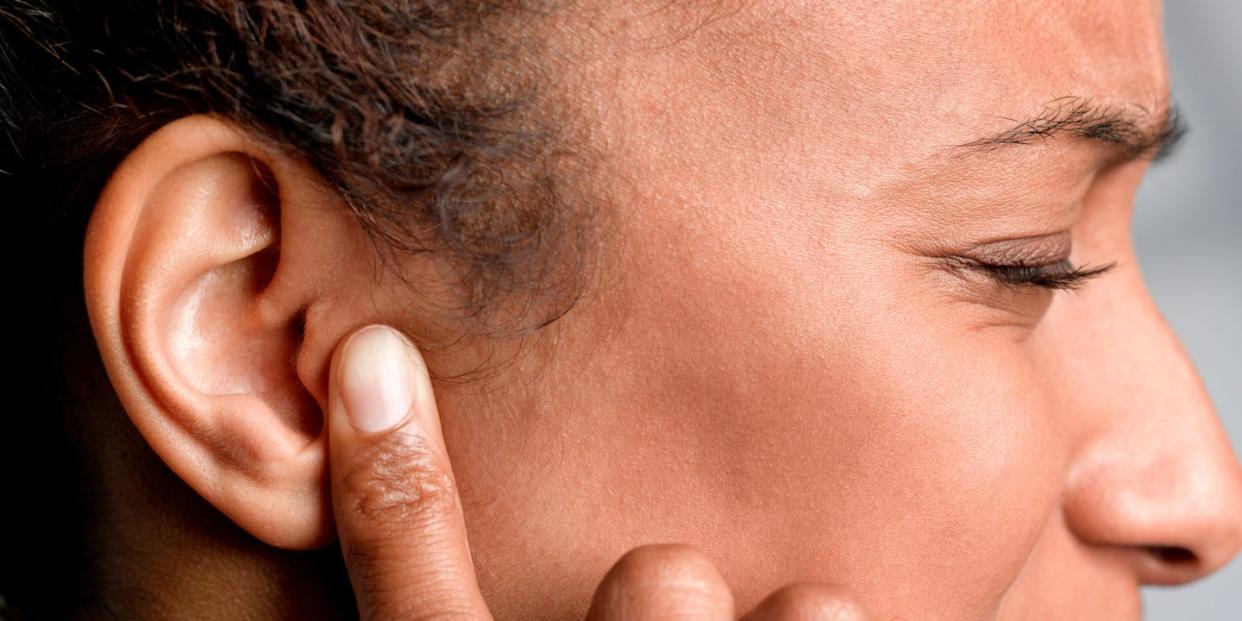Got Water Stuck In Your Ear? Here Are 7 Safe Ways To Fix It, According To A Doctor

Whether you regularly frequent the pool or you’re gearing up for another summer at the lake or beach, there’s a good chance you’re familiar with the nuisance of having water trapped in your ear (and the frantic internet search for how to get water out of your ear that follows). Even if you’re not an active participant of water sports, you've probably experienced this from just going about your daily life, such as by simply tilting your head while showering.
No matter how it happens, having water in your ear can make you feel uncomfortable, obstruct your hearing, and may even lead to an infection. Water that stays in your outer ear canal for a long time can cause swimmer's ear. But know that it’s not uncommon for people to feel like there is fluid in their ear, according to Angela Peng, MD, an assistant professor of otolaryngology — head and neck surgery at Baylor College of Medicine in Houston, and that doesn't necessarily signal an infection or another issue.
FYI, if you have swimmer's ear, you'll have drainage, itchiness, redness, and swelling in your ear, per the CDC. And when you pull your earlobes or put any kind of pressure on this general area, you'll feel pain. Check in with your doc if you're experiencing any of these symptoms, and they can prescribe an antibiotic ear drop to clear it up.
Ideally, you'll want to clear out any water in there to stop it from getting to this point. Generally speaking, though, Dr. Peng says you should not take matters into your own hands. Between inexperience and the inappropriate tools you use at home, you may end up injuring this area. Q-tips (or bobby pins, keys, or other instruments) can push earwax deeper into the canal, resulting in trauma to the ear canal, eardrum, and other structures, she says.
That said, there are steps you can take to safely remove any water that's in your ear. You just have to be extra gentle and careful.
1. Keep your ears as dry as possible
Putting on a swimming cap, ear plugs, or custom-fitted swim molds before jumping into the pool or ocean can keep water out of your ear and prevent any problems from happening in the first place.
2. Talk to your doctor about trying ear-drying drops
Over-the-counter ear-drying drops may be helpful for water-logged ears after swimming, bathing, or showering. A few drops into the affected ear should do the trick. But you shouldn't use them if you have punctured eardrums, swimmer's ear, ear tubes, or ear drainage, according to the CDC. That is why it's important to keep your health care provider in the loop.
3. Try a mixture of rubbing alcohol and distilled white vinegar
If you get swimmer’s ears all the time, you may want to try using a couple of drops of a 50/50 mixture of rubbing alcohol and distilled white vinegar in the canal, according to Dr. Peng. Use a sterile dropper to apply three to four drops in each ear and wait 30 seconds before tilting your head sideways to let the solution drain out.
4. Dry your ears after showering or swimming
This goes beyond just toweling off. Tilt your head back and forth, allowing each ear to face down and allow water to drip down and out of the ear canal. Alternatively, you can also try using a hair dryer on the lowest heat and speed or fan setting to move air through your ear canal and get the water out.
5. Put a cotton ball in your ear while showering
If you find that your showers are often the culprit, placing cotton balls with a small smear of petroleum jelly on the outside to seal your ears can prevent water from getting in, Dr. Peng says. “Just be sure to not reuse these inserts,” she notes.
6. Jiggle your earlobe or shake your head
It may sound too simple, but tugging at your lobes or shaking your head from side to side can sometimes be a quick fix. Lying on the affected side with your head on a towel may also allow the water to slowly flow out of your ear on its own.
7. If all else fails, see an ENT
Whether water in your ear is just annoying you, affecting your hearing, or giving you that plugged feeling, if none of these home remedies can do the trick, see a specialist such as an ear, nose, and throat doctor. They can conduct a more thorough evaluation, especially if you’ve built up a lot of wax and have frequent infections, says Dr. Peng.
You Might Also Like

